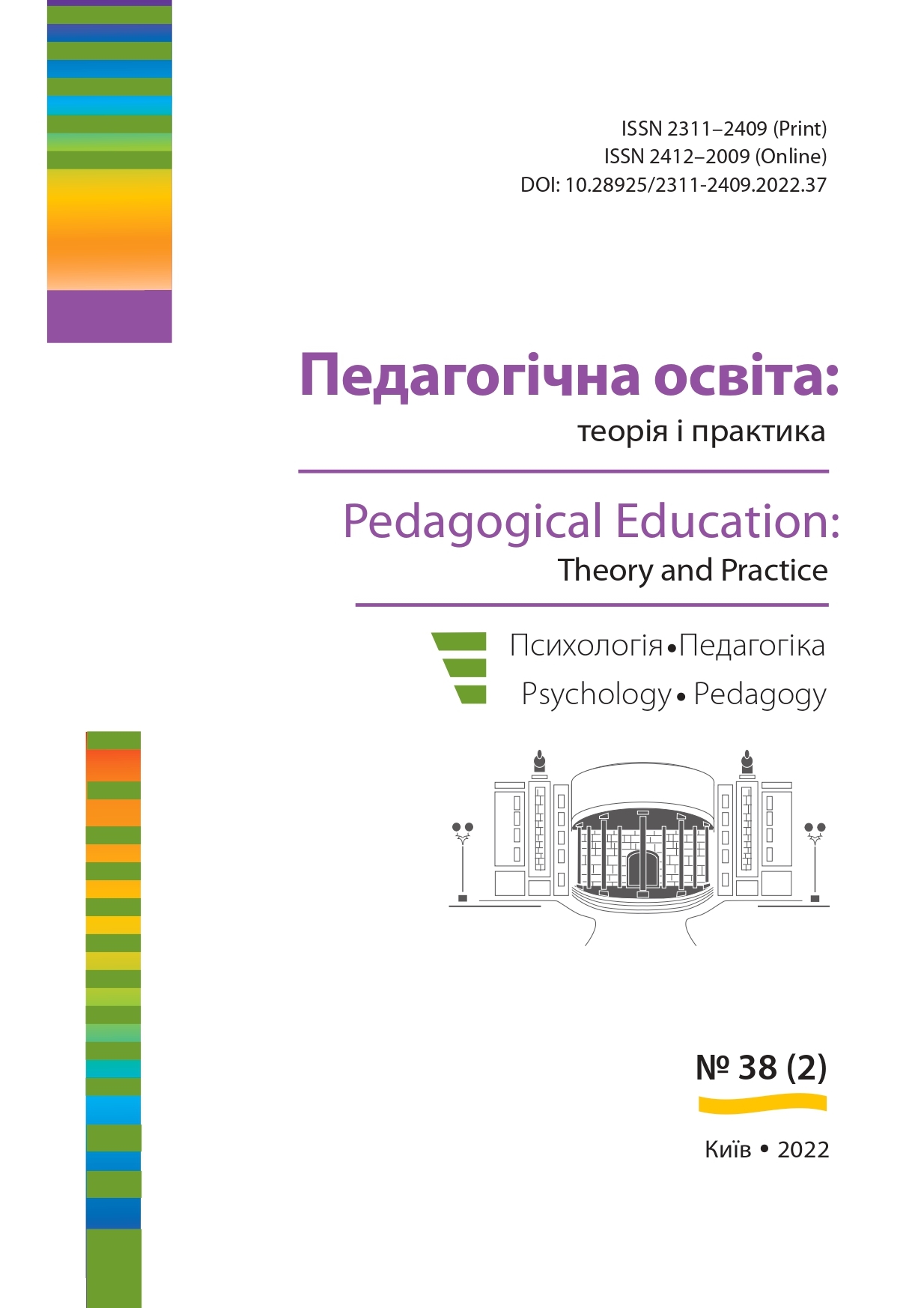FUNDAMENTALS OF QUALITY MANAGEMENT OF SENSORY-COGNITIVE DEVELOPMENT OF CHILDREN IN THE FOURTH YEAR OF LIFE IN A PRESCHOOL EDUCATION INSTITUTION
DOI:
https://doi.org/10.28925/2311-2409.2022.385Abstract
The article is devoted to the problem of managing the quality of sensory and cognitive development of children in the fourth year of life in the educational process of a preschool education institution. In particular, on the basis of the analysis of scientific intelligence on the research problem, it was determined that the sensory development of the child plays an invaluable role in the formation of his cognitive, research activity, is the basis of his mental development. Knowledge begins with the perception of objects and phenomena of the surrounding world. All other forms of cognition — memorization, thinking, imagination — are built on the basis of images of perception, are the result of their processing. Sensory education tasks are defined for each age, which correspond to the level of development of perception and at the same time contribute to the transition to higher levels. In this context, the fourth year of life is very important, because at this stage there are significant changes in the course of the mental processes of a growing personality, there is an expansion of ways and means of orientation in the environment, enrichment of children’s ideas about objects and phenomena of the surrounding world, and the development of cognitive activity is improved in interaction with an adult. Getting to know the properties of objects and the phenomena of the surrounding reality gives preschoolers the opportunity to apply the acquired knowledge in practical activities, to master various ways of learning about the surrounding reality. Ensuringthe effectiveness of sensory and cognitive development of children in a preschool education institution requires quality management of this process, deepening and concretization of pedagogical work.
Downloads
References
Базовий компонент дошкільної освіти. (Державний стандарт дошкільної освіти). Нова редак- ція [Електронний ресурс]. Режим доступу: https:// ezavdnz.mcfr.ua/book?bid=37876, вільний. Назва з екрана.
Богуш А., Малиновська Н. Методика розвитку мовлення і навчання рідної мови дітей раннього віку: навчально-методичний посібник. Київ: ВД «Слово», 2016. 392 с.
Гавриш Н., Безсонова О. Організація роботи груп раннього віку: проблеми та шляхи їх розв’язання. Дошкільне виховання. 2020. № 5. С. 3–5.
Дитина: освітня програма для дітей від двох до семи років. наук. кер. проєкту В. О. Огнев’юк; авт. кол. А. Г. Бєлєнька, О. Л. Богініч, В. М. Вертугіна [та ін.]; наук. ред. А. Г. Бєлєнька; Мін. осв. і на- уки України, Київ, ун-т ім. Б. Грінченка, 2020. 440 с.
Козак Л., Швидка І., Якість дошкільної освіти на сучасному етапі. Освітологічний дискурс, 2018, № 3-4 (22-23)
Лякішева А., Мозоль В. Розвиток пізнавальних інтересів старших дошкільників як наукова проблема. Педагогічний часопис Волині. 2018. № 4. С. 33-38
Пономаренко Т.О., Євченко Я.Б. Формування основ сенсорно-пізнавальної компетентності ді- тей раннього віку. Дошкільна педагогіка. Випуск 41. Т. 2. 2021
Шкляр Н. А. Формування позитивного ставлення до дошкільного закладу у дітей четвертого року життя: дис. канд. пед. наук: 13.00.08 «Дошкільна педагогіка». Київ : ІПВ НАПН, 2019. 234 с.
REFERENCES
Basic component of preschool education. (State standard of preschool education). New edition [Electronic resource]. Access mode: https://ezavdnz.mcfr.ua/book?bid=37876, free. Title from the screen.
Bogush A., Malinovska N. Methodology of speech development and teaching of the native language of young children: educational and methodological manual. Kyiv: VD «Slovo», 2016. 392 p.
Child: an educational program for children from two to seven years old / science. driver the project by V. O. Ognevyuk; author number A. H. Belenka, O. L. Boginich, V. M. Vertugina [and others]; of science ed. A. H. Belenka; Min. education and Sciences of Ukraine, Kyiv, University named after B. Grinchenko, 2020. 440 p.
Havrysh N., Bezsonova O. Organization of work of early age groups: problems and ways to solve them. Preschool education. 2020. No. 5. P. 3–5.
Kozak L., Shvydka I., Quality of preschool education at the current stage. ISSN Online: 2312-5829. Educational discourse, 2018, No. 3-4 (22-23).
Lyakisheva A., Mozol V. Development of cognitive interests of older preschoolers as a scientific problem. Pedagogical journal of Volyn. 2018. No. 4. P. 33-38
Ponomarenko T.O., Yevchenko Y.B. Formation of the basics of sensory and cognitive competence of young children. Preschool pedagogy. Issue 41. Volume 2. 2021
Shklyar N. A. Formation of a positive attitude towards a preschool in children of the fourth year of life: thesis ... candidate. ped. Sciences: 13.00.08 «Preschool Pedagogy». Kyiv: IPV NAPN, 2019. 234 p.

